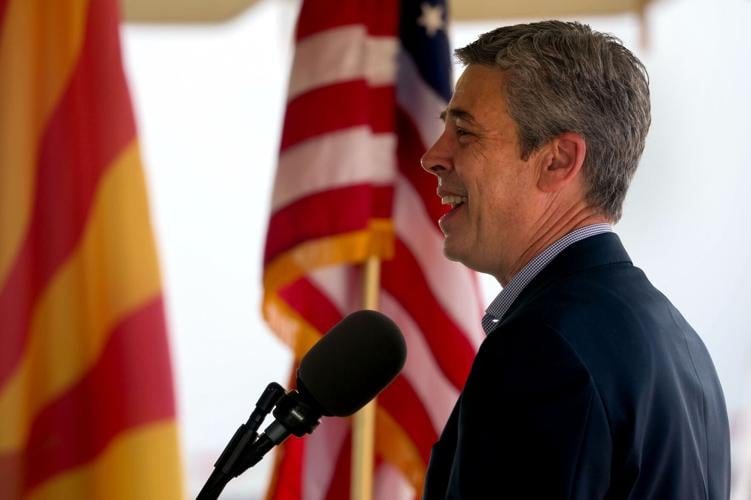Arizona electric cooperatives including Trico in Pima County and co-ops in Cochise and Mohave counties on Tuesday celebrated $55.2 million in federal loan funding to support three battery energy-storage projects.
Sierra Southwest Cooperatives Inc., which develops energy resources for Arizona’s nonprofit electric co-ops, announced Tuesday that it was awarded $55.2 million in funding from the U.S. Department of Agriculture’s Powering Affordable Clean Energy (PACE) program.
The federal funding, in the form of a partially forgivable loans authorized under the Inflation Reduction Act, will support clean energy projects developed by Sierra Southwest for the benefit of Arizona Electric Power Cooperative Inc. and its member distribution co-ops.
A senior USDA official was on hand at a ribbon-cutting ceremony Tuesday morning at Trico’s Sahuarita Substation, where the co-op recently built a 10-megawatt peak capacity, 40-megawatt-hour battery array that is part of the Arizona project funding.
Besides the Trico project, the federal funding will back a 10MW/40MWh system for Sierra Vista-based Sulphur Springs Valley Electric Cooperative, and a 15MW/60MWh system in Fort Mohave for Mohave Electric Cooperative. A 40MWh battery can provide 10MW of power to the grid for four hours, for example.
“These co-ops have made all these investments in solar energy, and that energy has been stored up and with these batteries now, they can release it back into the grid,” said Andy Berke, administrator of the USDA’s Rural Utilities Service. “And that is energy they don’t have to buy or generate elsewhere, getting the most that they can out of those investment and saving members money.”
The PACE program, administered by the Rural Utilities Service and funded for up to $1 billion under the Inflation Reduction Act, offers rural co-ops and other power providers infrastructure loans with repayment forgiveness of 20% to 40% for qualified projects in underserved rural communities and up to 60% in tribal communities.
Berke noted that the non-profit co-ops, which generally don’t pay federal taxes, can also take advantage of the 30% federal tax credit for renewable-energy and battery projects through a new direct-payment program.
Pairing existing solar generation with battery storage will harness daytime solar production to charge the batteries, providing a cost-effective energy source during peak demand in evening hours, Sierra Southwest said.
Trico is proud to be among the top five out of more than 800 electric distribution cooperatives in the nation for installed solar and storage capacity, CEO Brian Heithoff told ribbon-cutting attendees.
“Trico has a goal of reducing our carbon emissions by 50% by 2032, and we have a good plan for how to achieve that,” he said.
Trico, which serves about 50,000 members in rural parts of Pima, Pinal and Santa Cruz counties, announced in March that it is in line for $83.5 million in federal loans for four solar and energy-storage projects it plans to build in the next five years.
The head of Arizona G&T Cooperatives, the statewide generating and transmission cooperative that includes power-plant operator AEPCO and Sierra Southwest, said the three-in-one project funding approach was a creative way to save permitting time and construction costs as the co-ops looked at what they could do in the short term to build up generating resources.
“We think this is a very responsible project, a project that helps us propel us toward a cleaner future,” said Patrick Ledger, CEO of Arizona G&T Cooperatives. “And this is really, from our perspective, the first step in a longer term plan to implement smart, affordable and reliable, clean energy initiatives for our rural cooperatives and the public-power cooperatives.”
The drive to cleaner energy like solar and enabling technologies like battery energy storage will require investment in workers who bill maintain such systems, Ledger said, citing a new training effort with the International Brotherhood of Electrical Workers.
IBEW Local 570, which represents Sierra Southwest workers, is working with Cochise College to boost electrician training, said Joshua DeSpain, the local’s directing business representative.





